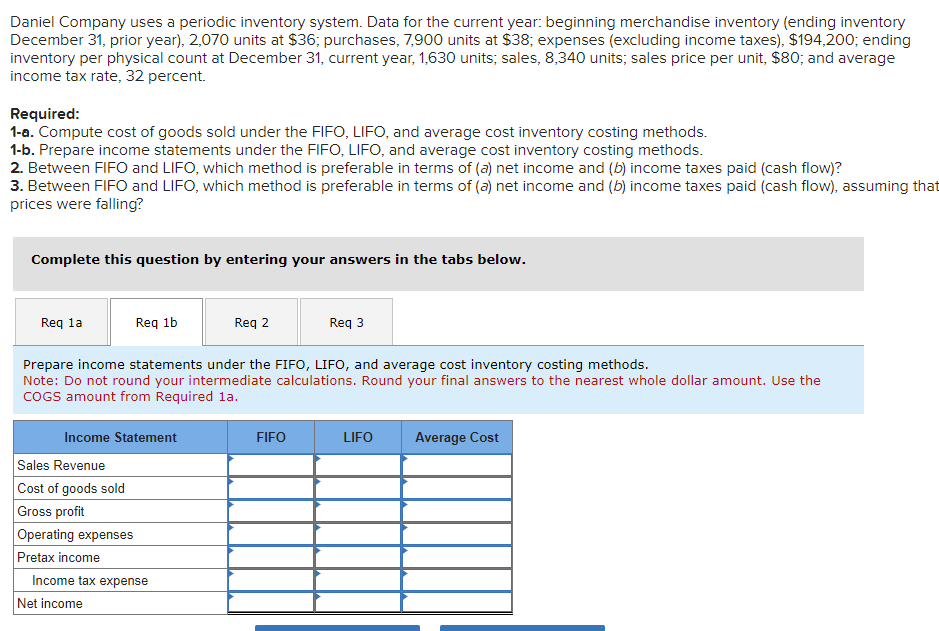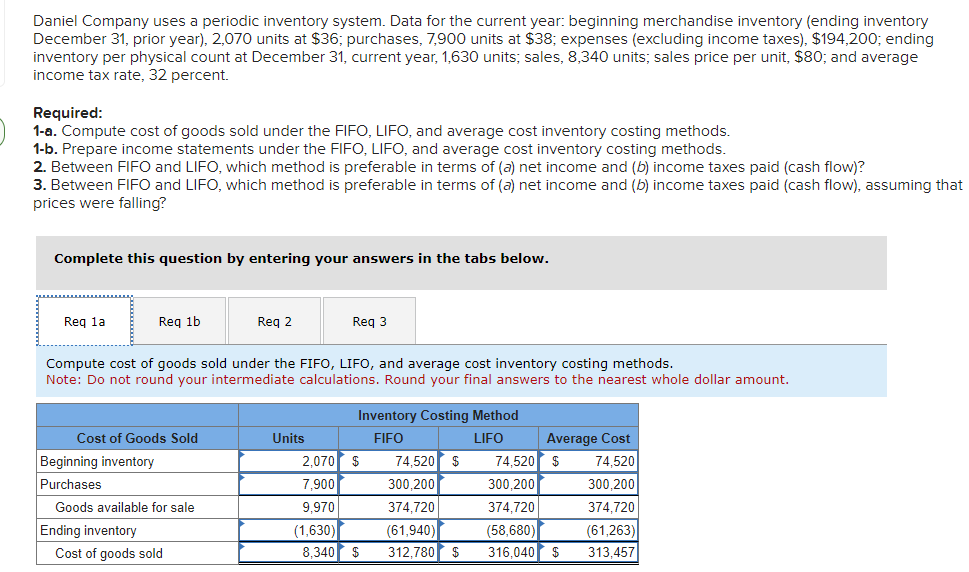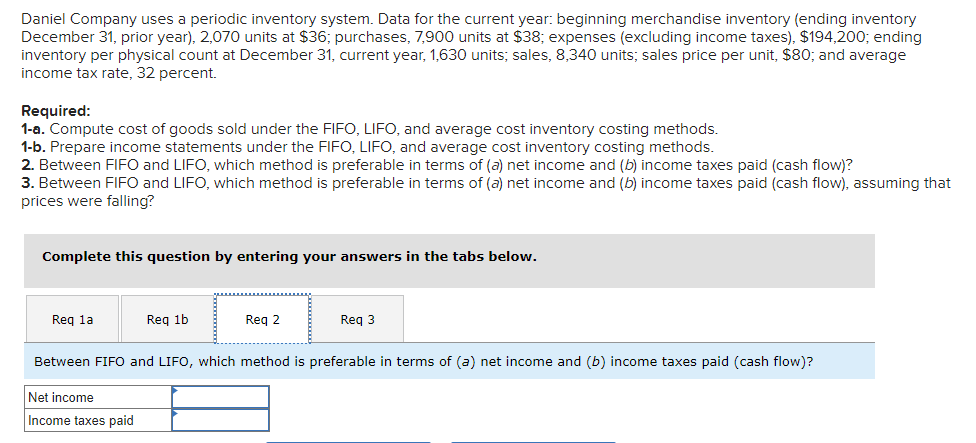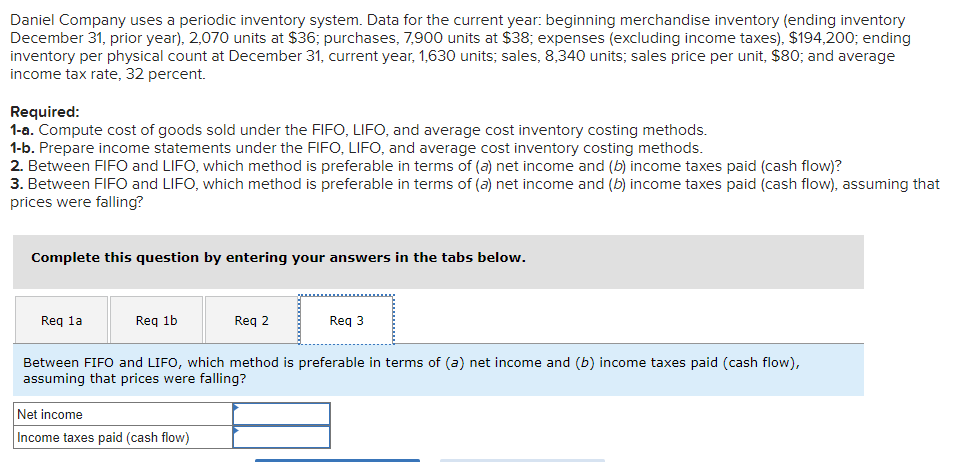Answered step by step
Verified Expert Solution
Question
1 Approved Answer
Daniel Company uses a periodic inventory system. Data for the current year: beginning merchandise inventory (ending inventory December 31, prior year), 2,070 units at




Daniel Company uses a periodic inventory system. Data for the current year: beginning merchandise inventory (ending inventory December 31, prior year), 2,070 units at $36; purchases, 7,900 units at $38; expenses (excluding income taxes), $194,200; ending inventory per physical count at December 31, current year, 1,630 units; sales, 8,340 units; sales price per unit, $80; and average income tax rate, 32 percent. Required: 1-a. Compute cost of goods sold under the FIFO, LIFO, and average cost inventory costing methods. 1-b. Prepare income statements under the FIFO, LIFO, and average cost inventory costing methods. 2. Between FIFO and LIFO, which method is preferable in terms of (a) net income and (b) income taxes paid (cash flow)? 3. Between FIFO and LIFO, which method is preferable in terms of (a) net income and (b) income taxes paid (cash flow), assuming that prices were falling? Complete this question by entering your answers in the tabs below. Req 1a Req 1b Req 2 Req 3 Prepare income statements under the FIFO, LIFO, and average cost inventory costing methods. Note: Do not round your intermediate calculations. Round your final answers to the nearest whole dollar amount. Use the COGS amount from Required 1a. Income Statement Sales Revenue Cost of goods sold Gross profit Operating expenses Pretax income Income tax expense Net income FIFO LIFO Average Cost Daniel Company uses a periodic inventory system. Data for the current year: beginning merchandise inventory (ending inventory December 31, prior year), 2,070 units at $36; purchases, 7,900 units at $38; expenses (excluding income taxes), $194,200; ending inventory per physical count at December 31, current year, 1,630 units; sales, 8,340 units; sales price per unit, $80; and average income tax rate, 32 percent. Required: 1-a. Compute cost of goods sold under the FIFO, LIFO, and average cost inventory costing methods. 1-b. Prepare income statements under the FIFO, LIFO, and average cost inventory costing methods. 2. Between FIFO and LIFO, which method is preferable in terms of (a) net income and (b) income taxes paid (cash flow)? 3. Between FIFO and LIFO, which method is preferable in terms of (a) net income and (b) income taxes paid (cash flow), assuming that prices were falling? Complete this question by entering your answers in the tabs below. Req 1a Req 1b Req 2 Req 3 Compute cost of goods sold under the FIFO, LIFO, and average cost inventory costing methods. Note: Do not round your intermediate calculations. Round your final answers to the nearest whole dollar amount. Cost of Goods Sold Units Inventory Costing Method FIFO LIFO Average Cost Beginning inventory 2,070 $ 74,520 $ 74,520 $ 74,520 Purchases 7,900 300,200 300,200 300,200 Goods available for sale 9,970 374,720 374,720 374,720 Ending inventory (1,630) (61,940) (58,680) (61,263) Cost of goods sold 8,340 $ 312,780 $ 316,040 $ 313,457 Daniel Company uses a periodic inventory system. Data for the current year: beginning merchandise inventory (ending inventory December 31, prior year), 2,070 units at $36; purchases, 7,900 units at $38; expenses (excluding income taxes), $194,200; ending inventory per physical count at December 31, current year, 1,630 units; sales, 8,340 units; sales price per unit, $80; and average income tax rate, 32 percent. Required: 1-a. Compute cost of goods sold under the FIFO, LIFO, and average cost inventory costing methods. 1-b. Prepare income statements under the FIFO, LIFO, and average cost inventory costing methods. 2. Between FIFO and LIFO, which method is preferable in terms of (a) net income and (b) income taxes paid (cash flow)? 3. Between FIFO and LIFO, which method is preferable in terms of (a) net income and (b) income taxes paid (cash flow), assuming that prices were falling? Complete this question by entering your answers in the tabs below. Req 1a Req 1b Req 2 Req 3 Between FIFO and LIFO, which method is preferable in terms of (a) net income and (b) income taxes paid (cash flow)? Net income Income taxes paid Daniel Company uses a periodic inventory system. Data for the current year: beginning merchandise inventory (ending inventory December 31, prior year), 2,070 units at $36; purchases, 7,900 units at $38; expenses (excluding income taxes), $194,200; ending inventory per physical count at December 31, current year, 1,630 units; sales, 8,340 units; sales price per unit, $80; and average income tax rate, 32 percent. Required: 1-a. Compute cost of goods sold under the FIFO, LIFO, and average cost inventory costing methods. 1-b. Prepare income statements under the FIFO, LIFO, and average cost inventory costing methods. 2. Between FIFO and LIFO, which method is preferable in terms of (a) net income and (b) income taxes paid (cash flow)? 3. Between FIFO and LIFO, which method is preferable in terms of (a) net income and (b) income taxes paid (cash flow), assuming that prices were falling? Complete this question by entering your answers in the tabs below. Req 1a Req 1b Req 2 Req 3 Between FIFO and LIFO, which method is preferable in terms of (a) net income and (b) income taxes paid (cash flow), assuming that prices were falling? Net income Income taxes paid (cash flow)
Step by Step Solution
There are 3 Steps involved in it
Step: 1

Get Instant Access to Expert-Tailored Solutions
See step-by-step solutions with expert insights and AI powered tools for academic success
Step: 2

Step: 3

Ace Your Homework with AI
Get the answers you need in no time with our AI-driven, step-by-step assistance
Get Started


